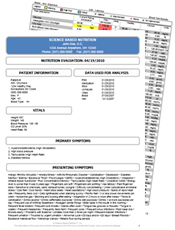
Protein:
Proteins help in the formation and repair of muscles. They can also be used for energy. Meat, eggs, beans, seeds, nuts, sprouts, and quinoa are an excellent source of protein. Avoid highly processed foods (especially those yummy and convenient lunch meats – Nitrates and Nitrites abound!) and in the case of dairy and soy, choose organically raised and processed products.
Carbohydrates:
Carbohydrates provide fuel during a workout or athletic event. Foods that are highly processed and/or contain added sugar, unfortunately, are not nutritious. Over time, processed carbohydrates can cause excess fat storage, low energy levels, and even muscle loss.(4) The carbs you want to avoid are: added sugar, refined flours and grains, concentrated fruit juice, high fructose corn syrup, chips, french fries and soda (even the so-called zero-calorie varieties). The most nutritious carbohydrates include: beans, lentils, whole grains, vegetables (squashes) and fruit.
Fats:
Historically, fats have had a bad reputation, but Nature has always intended for fat to provide energy. They also protect cell membranes, support the nervous system, and transport fat- soluble vitamins from within the gut to the rest of the body. There are two types of fat – saturated and unsaturated. Coconut and palm kernel oils, meat, and dairy products, such as butter, cheese and cream contain predominantly saturated fats which are more calorie dense than their unsaturated counterparts. The oils from plants and fish are predominantly unsaturated and usually contain a mix of the essential Omega 3,6 and 9 fatty acids. Foods to consider are nuts (brazil nuts, cashews, almonds, pecans, and walnuts), seeds (sunflower, pumpkin), dark oily fish (tuna, sardines, salmon), avocados, nut butters and plant oils (grape seed, olive, sesame, canola, sunflower). (4)
It’s Game Day – What Should you Eat?
About two hours before a match, so as to ensure proper digestion, eat a balanced meal with little fat. Snacks should be low gycemic index carbs to minimize the negative effects of simple sugars and to maintain hormonal balance. Examples are fruit (apples, bananas, oranges, strawberries), nut butters and hummus.
During an event, physical and mental performance improves with the consumption of carbohydrates and protein in a 4:1 ratio. Using this proportion has been shown to reduce fatigue and muscle damage.
After the game, make sure to have a well-balanced meal with adequate protein, carbohydrates and fat. The body will be going into a muscle rebuilding phase for the next 24 hours. (4)
Water:
Proper hydration is key for any athlete, hence the importance of considering intake prior, during and after exercise. If an athlete goes into an event dehydrated, no amount of water consumed during the event is going to get them back to a healthy state of hydration.
Tips on when to hydrate:
About 2- 3 hours prior to an event: 17 to 20 oz of water
After the warm up: 7 to 10 oz of water.
During the event: 28 to 40 oz of water for every hour of physical activity (about 7 oz every 10-15 minutes).
Within 2 hours after the event: 20-24 oz of water for every pound of body weight in order to replace the fluid loss from urinating and sweating. (5)
Remember it’s important to record an athlete’s water intake and to be alert to signs of dehydration: thirst, muscle cramps, weakness, decreased athletic performance, trouble focusing, headache, nausea, fatigue, reduced urine output, dark urine and/or dizziness.
Vitamins and Minerals:
If micronutrients are not being supplied by food, they should be supplemented. This is an area in which your health practitioner can be of support. For the purposes of this newsletter let me point to two frequently overlooked, but very topical, subjects.
- Vitamin D:
- The body needs approximately 3,000-5,000 IU of Vitamin D a day. Vitamin D helps support bone health and has been linked to muscle development and strength. (3) Research suggests also that Vit D boosts immunity and is supportive of healthy thyroid function.
- Probiotics:
- Many think that the effects of probiotics are limited to the GI tract. This is just the beginning! A literature review of case studies involving the use of probiotics found many other benefits, including faster recovery times for athletes, a healthier immune system and reduced inflammation. (1, 2)
Not sure where to start or have further questions? If you are an athlete, or the parent of one, it is never too late to reach out to a health professional versed in nutrition. It is important to start with a comprehensive blood and hair tissue analysis to check on the body’s foundation as a whole. This can help determine what you need to be consuming from a dietary and supplemental standpoint. It can also help indicate if there is something you need to be avoiding. What has worked for someone you know may be completely different than what will work for you. Contact us today to get started and improve your body safely and naturally.
Work Cited:
- Mercola.com, 18 Nov. “Probiotics Benefits for Athletes.” fitness.mercola.com/sites/fitness/archive/2016/11/18/probiotics-for-athletes.aspx.
- Curr Sports Med Rep. 2007 Jul;6(4):269-73
- Ogan D, Pritchett K. Vitamin D and the athlete: risks, recommendations, and benefits. Nutrients. 2013;5(6):1856–1868. Published 2013 May 28. doi:10.3390/nu5061856
- Heritage Integrative Healthcare Articles, 18 Sept. 2014, 4 “Nutrition 101 for High School Athletes” heritageihc.com/blog/nutrition-101-for-high-school-athletes/.
- McArdle, William and Katch, Frank; Exercise Physiology: Energy Nutrition and Human Performance, Sixth ed., Lippincott Williams and Wilkins, 2007 Chapter 25




